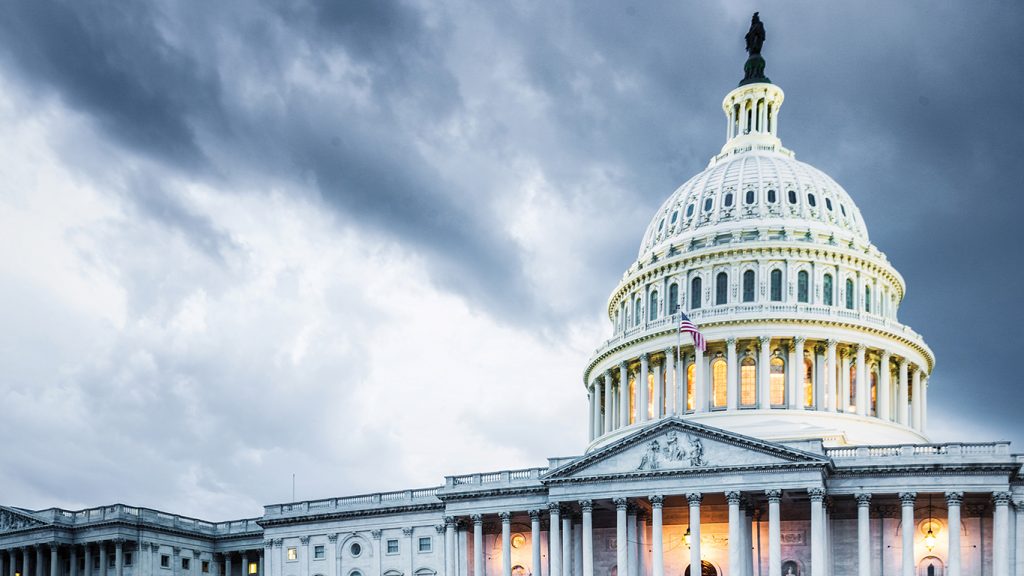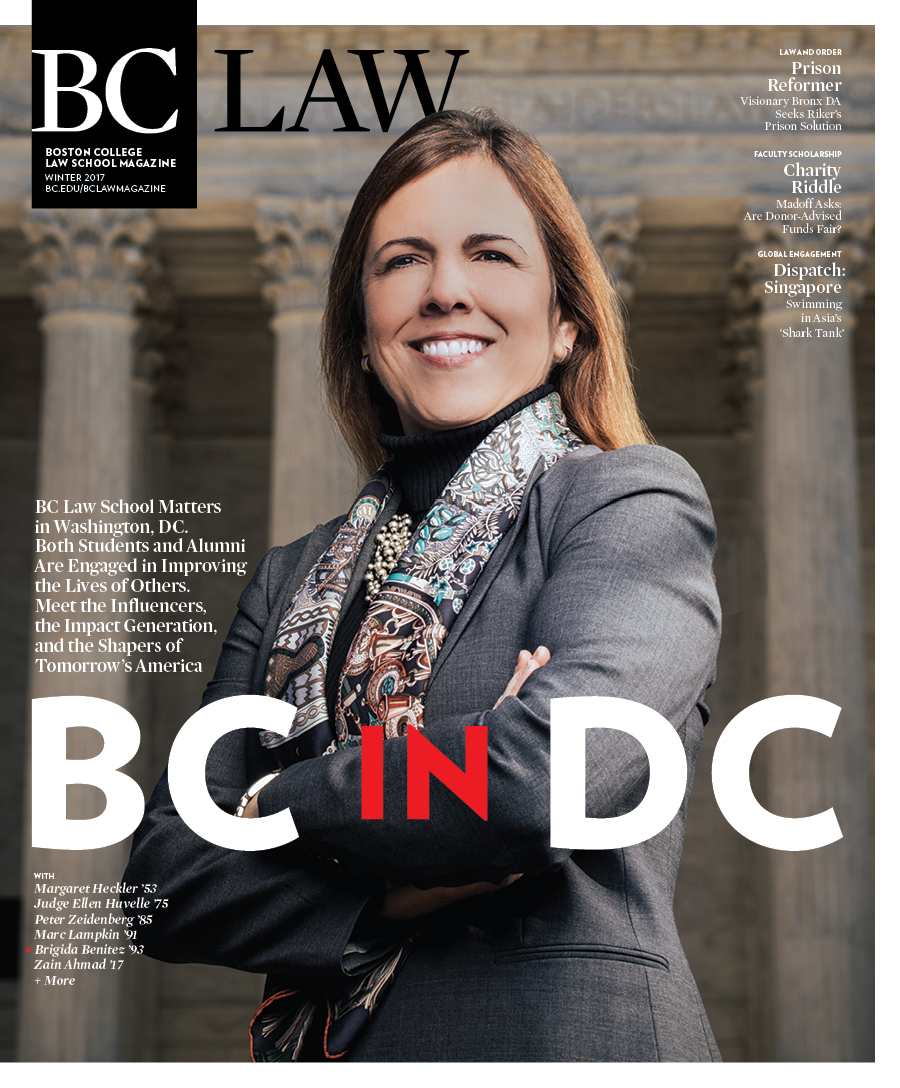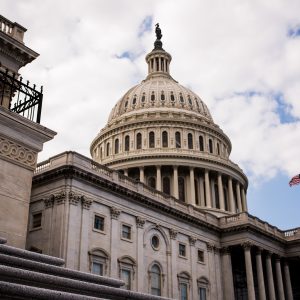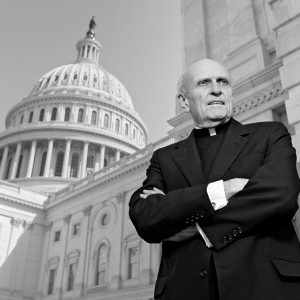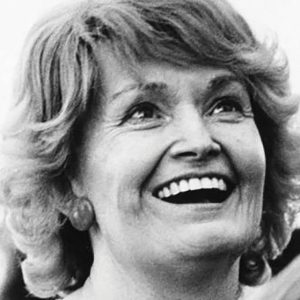From Congress to the Pentagon, from the State Department to public broadcasting, in law enforcement agencies and in the courts, alumni of BC Law are shaping the nation’s agenda. They are setting policy for displaced migrants, broadening the personnel of the armed forces, brokering access to legislators and policymakers, furthering informed public discourse, protecting an open, competitive market economy, and so much more. They have what it takes to do the work because of the skills they developed and the values they absorbed in law school.
“Our graduates who decide to spend part or all of their careers in our nation’s capital bring with them a dedication to professional excellence in wide-ranging areas of legal practice,” says Law School Dean Vincent Rougeau. “Many are inspired to work in the public interest, bringing with them a commitment to social and economic justice fostered by their Jesuit-influenced legal education. As they move within their wide and diverse spheres of influence, they are forwarding a vision of the law as a force for human dignity and the common good.”
As BC Law graduates frequently attest, being effective and influential in Washington requires strong connections and an active network. Brigida Benitez ’93 is a networker par excellence. In addition to her deep involvement with BC Law’s Alumni Association, the DC Bar is among her spheres of influence.
The DC Bar boasts about 100,000 members in all fifty states and more than eighty countries worldwide. It is responsible for taking disciplinary action against lawyers who fall short of professional ethical requirements, and offers pro bono services to low-income DC residents as well as continuing legal education programs. In 2014, Benitez served as the Bar’s forty-third president. She has also served as president of DC’s Hispanic Bar Association and as a member of the board of DC’s Women’s Bar Association.
“I think in DC, it’s particularly helpful to develop a broad network of people,” Benitez says. “It helps you to learn of opportunities that may be available. You keep your eyes open. I think it’s important to be proactive and drive your career in the direction that you want it to go.” A partner at Steptoe & Johnson, Benitez handles complex litigation and global anti-corruption matters. She once served as Chief of the Office of Institutional Integrity of the Inter-American Development Bank. Her spheres of influence have a global reach, particularly into Latin America and elsewhere.
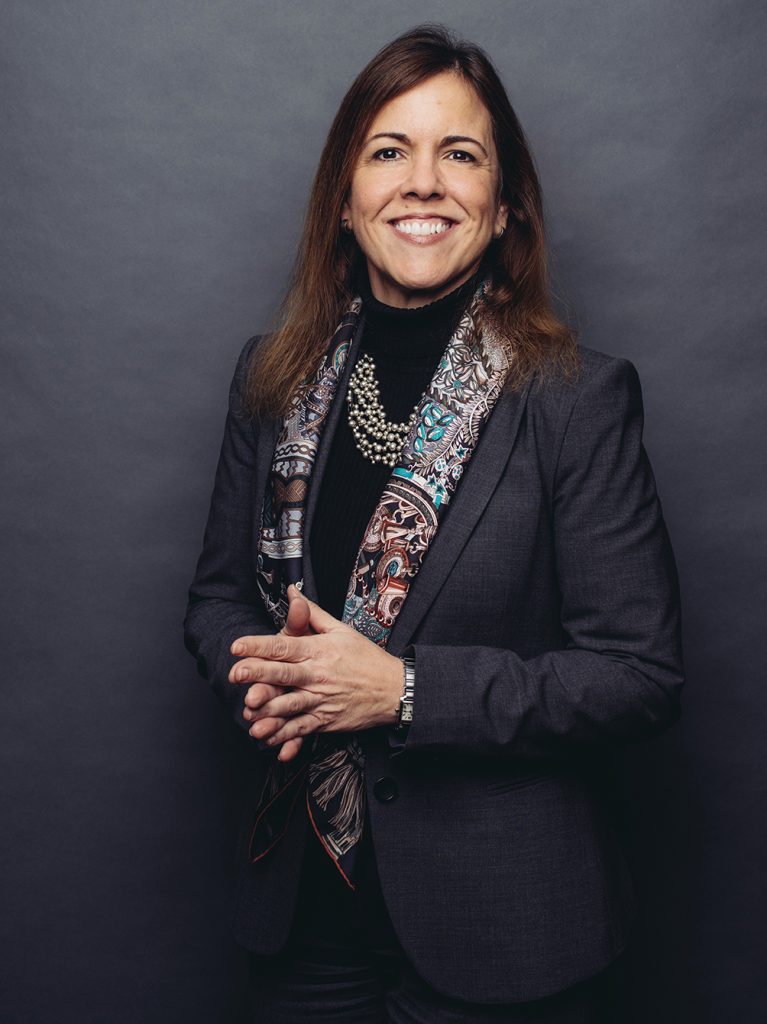
The classic image of the DC influencer is, of course, the lobbyist. It’s a term that can conjure negative stereotypes—remember the movie Thank You for Smoking?—but Marc Lampkin ’91, a lobbyist and a managing partner with the firm Brownstein, Hyatt, Farber & Schreck, is having none of that.
Lampkin helps Fortune 500 and Fortune 1000 corporations, trade associations, and individuals to participate in the crafting of laws and regulations, and in doing so, he says, helps to ensure that well-meaning legislation doesn’t have negative, unintended consequences. “We have a right to petition our government. That is embedded in the First Amendment of the Constitution,” Lampkin says. “What we do as lobbyists is we help people effectuate their constitutional right.”
As a lobbyist, Lampkin says that he acts as an interpreter, a connector, and a problem-solver. “I understand what the landscape looks like, and I provide my clients with: ‘Here’s the pathway to success, and here are the levers that you need to pull, and here is how you ought to shape the answer to the question we may get,’ and that allows them to actually amplify their relative position in the decision-making process in Washington,” he says.
Among his many accomplishments, Lampkin takes pride in his work on the Coverdell Education Savings Account bill, which helps families to finance their children’s education, and a bill he drafted that allows teachers to take non-itemized deductions on their personal expenditures for school supplies and activities.
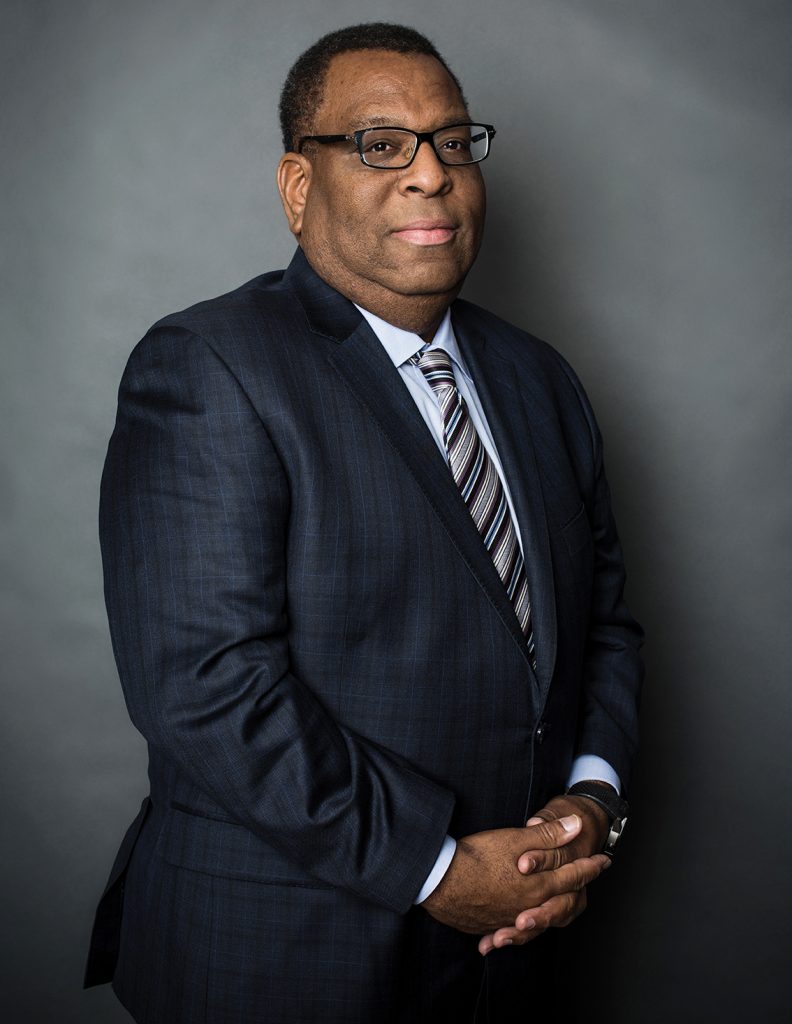
Beyond lobbying, what does it mean to have influence in Washington? Thomas Miller ’79, of the Navy’s General Counsel’s office, calls DC a company town. “Most of what goes on here revolves around the federal government. Either you work for the executive branch, or you work on the Hill for Congress, or you are a lobbyist, or you are practicing law with the various courts,” says Miller, who, in his capacity with the Navy’s office of Manpower and Reserves Affairs, has worked on the repeal of Don’t Ask/Don’t Tell and is helping to draft regulations to enable transgender individuals to serve in the military. “The way you get ahead, I believe, is to get a broad base of experience within your particular agency or department or in your particular area of general expertise,” he says.
Establishing that broad base of experience can happen in many ways. Some lawyers rise in the place where they start. Miller, for example, began as a JAG officer and has made his entire legal career in the Navy. Others migrate to Washington early in their careers and move fluidly between the public and private sectors. Still others have long careers far from the nation’s capital. The connections that they make on the coasts or in the heartland bring them to Washington later in life.
Richard Feinstein ’77, a partner at Boies, Schiller & Flexner, worked right out of law school for the Justice Department’s anti-trust division, then joined a now-extinct boutique law firm in 1985. That was a quiet time for anti-trust enforcement, but it was also a time when the idea of health care as an industry was emerging. “There were mergers and there were disputes between doctors and hospitals, and I got involved in a fair amount of that stuff even though I hadn’t done anything about health care when I was in the government,” Feinstein says. As he became versed in issues of anti-trust, competition, and health care, his connections led to an offer to join the Federal Trade Commission. He served from 1998 to 2001 as assistant director of the FTC’s Bureau of Competition, Health Care Services, and Products Division. In 2001, he joined Boies, Schiller & Flexner, then returned to the FTC to do anti-trust enforcement for four years, and is now back at his law firm.
J. “Ned” Holland ’68, of Kansas City, Missouri, was getting ready to retire when he heard that his close colleague, Kansas Governor Kathleen Sebelius, had been nominated by President Obama to head the US Department of Health and Human Services. His curiosity piqued, he started sifting through the Plum Book, a roster of appointed jobs in the federal government. Up popped a job he felt qualified for: HHS Assistant Secretary for Administration, Senior Sustainability Officer. He went home that night to his fiancé (now his wife) and said, “How would you like to go to Washington?”
She said, “That’s a terrific idea! Why don’t you talk to Kathleen.”
He said, “Fine, I’ll call Kathleen in the morning.”
She said, “Call her? You’ve got to go over and see her! What are you talking about, ‘call her’?”
Holland hopped in the car and drove to see the governor. They spent some time talking about business that they had in common health care policy and such—and then Holland said, “Oh, by the way, it looks like you are going to get confirmed. You are going to go to Washington. There is this job that I could do and I’d come to Washington if you wanted me to.”
He gave her his résumé, and, as he says, “The rest is history.”
Holland did become the HHS Assistant Secretary for Administration, Senior Sustainability Officer, as the capstone to a long career in the private sector in Kansas City. He had spent twenty-four years at Spencer, Fane, Britt & Browne, a venerable Kansas City law firm, where he practiced health care, especially hospital employment law. In 1992, he became chief administrative officer for Payless Cashways, Inc., a Home Depot-style retailer, and from 1999 to 2006, Holland was a high-level executive at Sprint, based in Oberland Park, Kansas, overseeing human resources and labor relations. In 2006, he moved on to Embarq Corporation to serve as Senior Vice President of Human Resources and Communications. All the while, Holland was active in local and state politics. “Those connections led me to get to know and be close to a lot of political leaders,” he says.
Thanks to Sprint, the largest purchaser of health care in the area, Holland often encountered Kansas’ then-insurance commissioner Sebelius. The two became close civic and political friends, and that was the genesis of the connection that landed him the job at HHS in 2009. He served there for more than six years.
“The appointees who do the kinds of things that I have done for HHS tend to be two ends of a demographic barbell,” Holland observes. “Either they are young, inexperienced, hard-charging, smart, hard-working people with a future building a résumé, or they are senior people who have been successful in other careers, who no longer need the level of income that they can earn in the private sector and who are prepared to make a contribution. I fall into the latter of those two.”
Suzanne Sheldon ’86 changed her path mid-career. Now the head of the Bureau of Population, Refugees, and Migration at the US Department of State, a few floors down from former Secretary of State John Kerry ’76, Sheldon practiced civil litigation in a Boston law firm for twelve years before setting her sights on a career in foreign affairs. She passed the foreign-service exam and went to work for the State Department.
The job took her to Colombia, Pakistan, and Iraq, where the recurrent theme of her work was shoring up the rule-of-law norms and institutions in those countries. Since joining the bureau in Washington in 2008, Sheldon has been responsible for ensuring that life-saving humanitarian assistance reaches migrants fleeing war, persecution, and human rights abuses. As a US spokesperson, she engages with international NGOs and the United Nations. “My sphere of influence is really the multi-lateral policy world,” she says. “I feel that, probably in a modest way, I have put in motion things that will have a lasting impact on the quality of life of actual human beings on the ground.”
The influence that Lisa Lindstrom Delaney ’86 enjoys comes from her position as Senior Vice President and General Counsel of WETA Public Television and Radio, where she started as an associate general counsel 1993. Hers is a media business located where the seat of government resides, where national cultural institutions flourish, and with unusual access to important people and the ability to beam their work and ideas across the country and throughout the world. “We are able to get lawmakers and journalists and visiting dignitaries in a way that a station in Chicago might not be able to,” Delaney says.
With programs like the PBS NewsHour, Washington Week, In Performance at the White House, the Kennedy Center Mark Twain Prize, and documentaries by filmmaker Ken Burns, WETA is the second largest producer of programming for national distribution by PBS (after WGBH Boston).
The educational mission of PBS, the seriousness of its news and public affairs programming, syncs with the value that Delaney herself places on learning and education.
“I like reaching people on some level. When Gwen [Ifill] did a town hall with President Obama, or we did a candidate primary debate, or we did pretty much wall-to-wall coverage of the conventions this summer in a way that most news outlets weren’t doing—that seriousness reaches people and is meaningful to people,” Delaney says.
“I think public media is incredibly important and I have a small role in facilitating the programming and the broadcasting of that programming that I think is really helpful to our community, to our country, to informed citizenry,” Delaney adds.
Networking is how Robert L. Eskridge III ’05 landed his position as counsel to the Ethics Committee of the US House of Representatives. Originally a litigator in Columbus, Ohio, Eskridge made a point of getting to know everyone involved in the matters he handled. “I expressed a desire to someone that I wanted to take my professional responsibility, my interest, my desires, and I wanted to shape those latent things, those gifts that were unbeknownst to me and go to the next level,” Eskridge says. He realized that he wanted to be in public service, and, through connections, the opportunity on the Ethics Committee presented itself. “It’s very hard work, very sensitive information with which I’ve been entrusted by the American public,” he says.
Like many of his Law School colleagues, Eskridge generously makes himself available to students thinking of a career in Washington, and to grads working on Capitol Hill who are looking for a mentor. “The BC Law community on Capitol Hill is great,” he says. “It is thriving and we are visible.”
Eskridge feels he is most influential as a role model. He could live anywhere in the greater DC metropolitan area, but has chosen to settle in Prince George’s County, which is nearly two-thirds African American. “Me going to work every day—somebody is watching that,” he says. “That is a visual for somebody. I’m not doing this just to keep my lights on and my family fed and to live in this place in DC. I’m doing this for the twenty-three other people that I may not see and are depending on my example and I don’t want to let them down.
“I believe that revolution is a lifestyle now,” Eskridge says. “If I can live my life that’s exemplary of a man of integrity, a pillar of good work and truth, an example to my family and my community—that’s revolution.”
Just so.
As Dean Rougeau says, “Training aspiring students to be good lawyers is an important part of what we do at BC Law. But we aim for more. We want our graduates to lead good lives, and through their work to serve others and enrich their communities. The presence of BC Law graduates in Washington, DC, can be a powerful force for good.”


